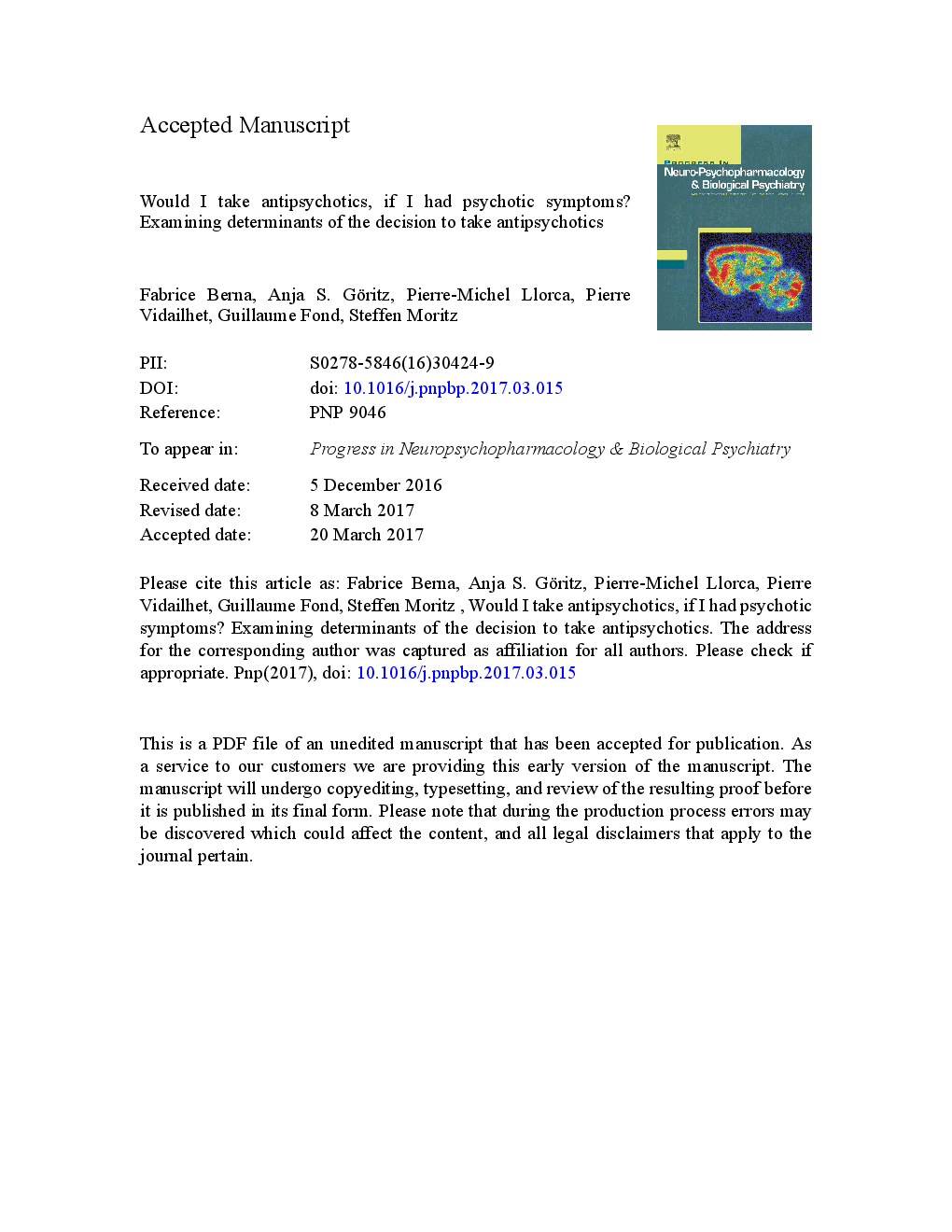ترجمه فارسی عنوان مقاله
آیا عوارض جانبی روانپزشکی دارم؟ بررسی عوامل موثر در تصمیم گیری در مورد ضد روان شناختی
عنوان انگلیسی
Would I take antipsychotics, if I had psychotic symptoms? Examining determinants of the decision to take antipsychotics
| کد مقاله | سال انتشار | تعداد صفحات مقاله انگلیسی |
|---|---|---|
| 156964 | 2017 | 27 صفحه PDF |
منبع

Publisher : Elsevier - Science Direct (الزویر - ساینس دایرکت)
Journal : Progress in Neuro-Psychopharmacology and Biological Psychiatry, Volume 77, 3 July 2017, Pages 155-163
ترجمه کلمات کلیدی
نگرش منفی، اولویت درمان، استقامت، بیماری شدید روانی،
کلمات کلیدی انگلیسی
Negative attitudes; Treatment preference; Stigma; Severe mental illness;
ترجمه چکیده
پیوستگی ضعیف به درمان در اسکیزوفرنی به طور عمده به عوامل مربوط به بیمار بستگی دارد. با این حال، بازنمایی منفی اجتماعی اسکیزوفرنی و درمان آن نیز ممکن است به تصمیم بیماران در مصرف داروهای ضد روان پریشی کمک کند یا نه. یک مطالعه مبتنی بر وب برروی 1807 نفر شرکت کننده انجام شد که در آن شرکت کنندگان تصور می کردند که بیماری خاص مزمن مبتنی بر بیماری های بالینی (بیماری های روانی: اسکیزوفرنی، افسردگی، بیماری های جسمی: مولتیپل اسکلروز، آرتریت روماتوئید) است. شرکت کنندگان دچار افسردگی ذهنی خود را در نظر گرفتند و درک هر گونه بیماری را در بر می گرفتند. آنها همچنین از نظر درمانی درمان بیماری، اعتقاد به اثربخشی درمان و ترجیح درمان آنها در مورد دارو ارزیابی شده است. نتایج نشان می دهد که اسکیزوفرنی بیشتر ناراحت کننده، کمتر قابل درمان و مرتبط با شیوع اجتماعی بالاتر نسبت به بیماری های جسمی است. دارو برای درمان اسکیزوفرنی نسبت به بیماری های جسمی کمتر ترجیح داده شد. درمان پذیری درک بیماری و اعتقاد به اثربخشی درمان دارویی، به ترتیب عوامل موثر بر مصرف دارو در اسکیزوفرنی و افسردگی بود. این عوامل تأثیر ضعیفی بر ترجیح داروها در بیماری های جسمی داشتند. مطالعه ما نشان دهنده بازنمود شدید منفی بیماری های روانی به طور کلی و درمان آنها، به ویژه اسکیزوفرنی است. این نگرش به بیماران محدود نمی شود و ممکن است تصمیم بیماران را برای مصرف داروهای روانگردان تحت تاثیر قرار دهد.

